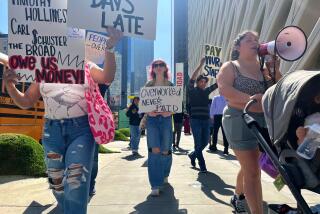The Bar Tab That Wouldn’t Die: 1980 Claim Reaches Other End of Earth : Litigation: A $5 beef has mutated into a $165,000 feud. Still, neither side will back down.
- Share via
It started out simply, as complicated things often do.
One night long ago, Denis O’Brien walked into the Mousetrap, a restaurant on the edge of the University of Virginia campus in Charlottesville. O’Brien was looking for friends. When he found them, he turned to walk out.
A cashier stopped him. O’Brien was asked for the red tab the restaurant issued customers to keep track of their food and drinks. The Mousetrap charged a $5 fee for lost tabs, O’Brien was told.
It could have ended there, but it didn’t. O’Brien could have paid the fee, but he wouldn’t. The restaurant could have let him go, but it wouldn’t. Over 10 years, the dispute escalated. Lawsuits and countersuits were filed in two states and two countries.
The restaurant has since gone out of business, but that $5 tab fee has grown to more than $165,000.
On that night--Feb. 29, 1980--O’Brien, then a University of Virginia graduate student in pharmacology, screamed that paying anything would violate his rights because he had eaten nothing and drunk nothing. The management called the police and he was taken to the Charlottesville jail. A magistrate refused to issue an arrest warrant and O’Brien was released.
O’Brien could have let the matter end there, but he demanded a published apology from the restaurant and threatened to sue.
Instead, he received a reply from the Mousetrap’s attorney, John C. Lowe: “You would be very foolish to get a lawyer who is merely good. You had better get a superb lawyer if you are to avoid serious liability and expense to yourself.”
The dare made, O’Brien hired a lawyer and filed lawsuits in U.S. District Court and Charlottesville Circuit Court against the restaurant, alleging false imprisonment, abuse of process and defamation. He posted signs on campus inviting anyone who had had “a hassle with the Mousetrap over their red-ticket policy” to call him. He called newspapers to explain his complaint.
O’Brien’s lawsuits eventually were dismissed for various reasons--another potential ending to the story--but, after he moved to Massachusetts to do post-doctoral work at Harvard University, the Mousetrap sued O’Brien, alleging that he had “grossly distorted the facts of the incident” with “malicious intent” to injure the restaurant’s reputation.
The Mousetrap’s attorney sent a written notice to O’Brien at his last known address, but O’Brien (who said Lowe knew how to reach him at Harvard) said he never received it. The letter was returned March 31, 1982, unopened and marked “not delivered,” court records show.
The trial opened in Charlottesville without O’Brien present. It was valid under Virginia’s so-called long-arm statute, which requires only that a plaintiff obtain an affidavit from the Secretary of the Commonwealth showing that written notice was sent to the defendant’s last address.
O’Brien said he learned of the suit when he called a friend at the University of Virginia and was told that he had just lost the case. O’Brien said he decided not to attend the second phase of the trial, at which a jury determined damages.
“By then I was already guilty,” O’Brien said. “My advice at that time was don’t show up, because they never notified me of any hearing.”
Without O’Brien in the courtroom, the jury awarded the restaurant $60,000 in damages.
Lowe said that O’Brien is to blame for his problems. “All he had to do, all these years, was come and tell the judge the story. He knew the suit was coming. Had he come to the judge, the judge would have reopened it. He didn’t tell anybody he was in town. He just decided he was going to be clever, I guess.”
O’Brien did not pay the judgment and Lowe pursued him in Massachusetts courts. O’Brien said the matter still was not decided when he moved to New Zealand in 1984.
“I don’t know that anybody was ever looking for me,” he said. “I wasn’t hiding from them here. I had made my decision to leave the States back in the early 1970s. The precipitating reason was actually Kent State (when National Guardsmen shot and killed four students during a 1970 protest of the Vietnam War). . . . I had given up on the American judicial system when I left there.”
For nearly seven years, O’Brien found peace from the Mousetrap suit.
But the search for him had not ended.
“His attorney wouldn’t tell us where he was. His parents wouldn’t tell us where he was,” Lowe said. “I pursue every judgment I get.”
Lowe said that one of his law students examined a computerized list of medical bibliographies and found an article O’Brien had written that revealed where O’Brien was working.
One cool New Zealand evening last October, a court officer appeared on O’Brien’s doorstep bearing papers saying that O’Brien, by then a 42-year-old pharmacology lecturer at the Central Institute of Technology in Trentham, still owed the $60,000 judgment--plus interest.
The matter is in a New Zealand court, and a judge, Master J. H. Williams, has scheduled it for trial.
Back in the States, Dianne Brubaker, who owned the restaurant and contends the negative publicity from O’Brien’s protests drove her out of business, says she has not forgotten. The Mousetrap’s decline is burned into her memory and she has no intention of letting the matter rest.
“I want to end the story as it should be,” she said.
Her attorney, Lowe, said: “Now, the day of reckoning is at hand. We got a valid judgment that we are collecting on.”
Brubaker, who ran the restaurant for nine years before it closed in 1983, said O’Brien put up notices and told lies that the restaurant had mistreated him. She said business dropped off considerably after that. She would not say by how much.
“It was someone screaming bloody murder. I thought it would blow over, but he continued. Even right now,” she said recently, “my heart is racing with just the thought of Mr. O’Brien and his actions.”
O’Brien said his motive was not to drive the restaurant out of business, but to let people know that if they had lost tabs at the Mousetrap they should not be prosecuted.
“I disagreed with the policy,” he said. “I don’t think people go into a restaurant to get into legal mumbo-jumbo. . . . You go in to get a sandwich or beer. They had this six-foot sign with rules. They said if you pass that sign, it’s a contract. Who stops and reads a sign?”
Ironically, both sides say the red food tab that is at the heart of the dispute turned up in O’Brien’s pocket the night he left the magistrate. O’Brien said he found it in his jacket pocket and tore it up out of anger.
Lowe and Brubaker said they decided to countersue O’Brien after they heard that he had the tab when he left the restaurant. “If he had just given them the red ticket, he would never have had to pay,” Lowe said. “The story starts and ends with Denis O’Brien saying he didn’t have the red ticket when he did, and (his) filing suit.”
Brubaker, who has since retired, said she was hurt personally by the bad publicity. She says money is not the issue. “What I need is peace of mind,” she said. “Vengeance has nothing to do with this.”
O’Brien said that if he cashed in everything he owns in New Zealand, he couldn’t pay a 10th of the $165,000 demanded. “I know it won’t end with my paying them,” he said. “It’s simply not an option I would exercise--not unless they can demonstrate I’ve done something wrong.”
What if the New Zealand court rules against him? “Those are decisions and bridges I have to cross when I come to them,” he said.
“I would settle if they published an apology and compensated for my legal fees. That’s how the whole thing got started. I requested an apology in the beginning.”
More to Read
Sign up for Essential California
The most important California stories and recommendations in your inbox every morning.
You may occasionally receive promotional content from the Los Angeles Times.













